Goats can be funny sometimes. You will see goats eat the weirdest kinds of plants and other items. For example, many homesteaders and farmers have seen goats eating plants such as poison ivy.
Why do goats eat poison ivy and can goats eat poison ivy without getting hurt? Goats love to eat poison ivy and it is safe for them to eat this plant. The bacteria in the rumen of goats help digest the toxic oil in poison ivy that causes rashes and itching. There is no record of goats being harmed from eating poison ivy.
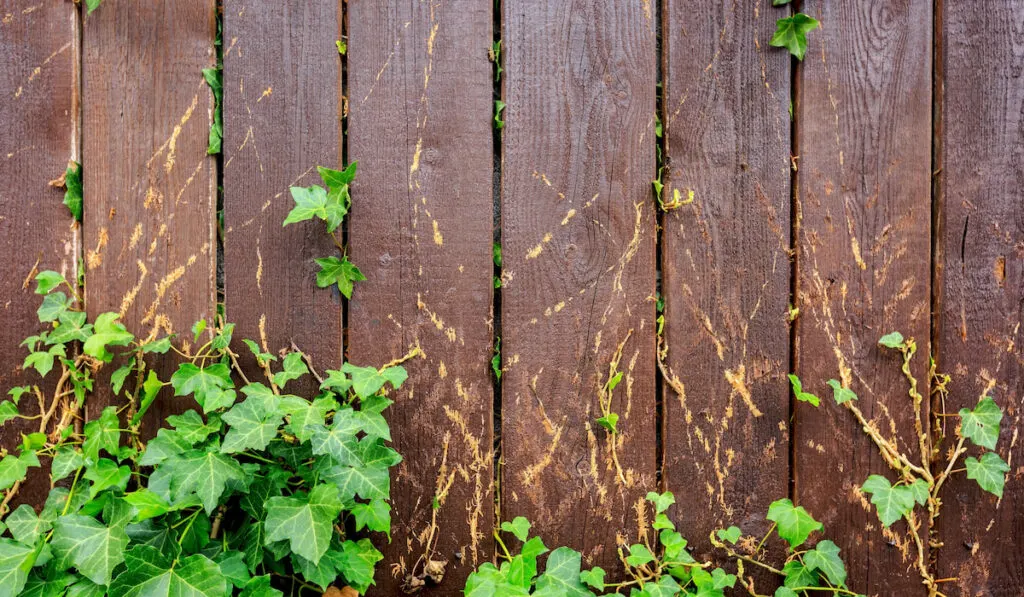
Table of Contents
Is Poison Ivy Safe for Goats?
So far, no harm has been recorded on goats that eat poison ivy leaves. Even though poison ivy leaves contain toxins and other substances that can cause allergies, they do not seem to have this affect on goats.
Does Eating Poison Ivy Affect Goat Milk?
Poison ivy toxins and oils are not found in goat milk. Goats completely digest poison ivy leaves through the help of microbes and enzymes, so it gets completely breakdown and becomes harmless in goats.
It is safe to drink the milk of goats that may have eaten poison ivy leaves.
Can Young Goats (Kids) Eat Poison Ivy?
You should feed young goats with milk, hay, grass, pellets, etc. Give them nutrient-rich foods that will help them grow well. Do not let them eat poison ivy and other foods that you are not so sure of their nutrition.
Other Poisonous Plants Goat Can Eat
Here are some plants that you might be afraid to touch, but goats can eat:
1. Poison Oak
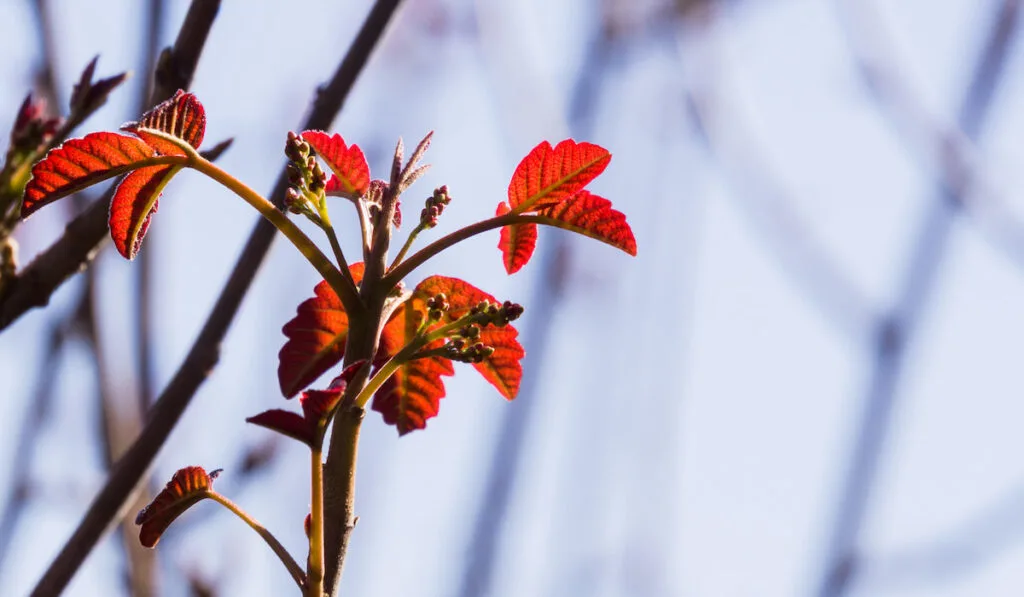
Poison oaks are trees in the family Anacardiaceae. Examples of poison oaks that can cause itching just like goats are Pacific poison oaks (Toxicodendron diversilobum) and Atlantic poison oaks (Toxicodendron pubescens).
Just like poison ivy, consuming these trees are considered unsafe for most animals, but goats can eat their leaves.
2. Poison Sumacs
Just like poison oaks, poison sumacs (Toxicodendron vernix) are in the family Anacardiaceae. Poison sumacs are also called thunderwoods.
They may cause itching for humans, but are safe for goats.
3. Mango Trees
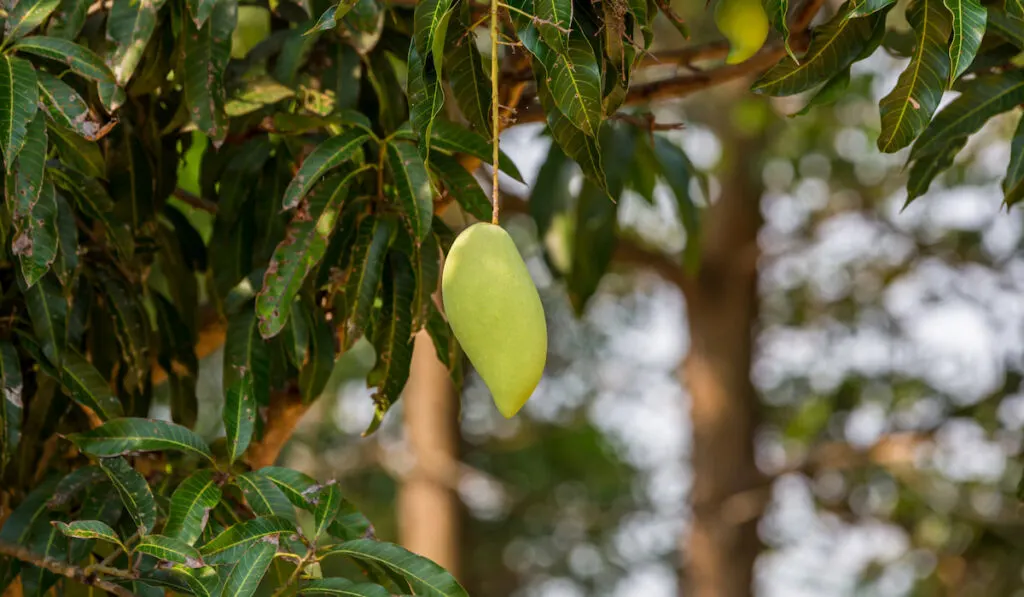
Do you know that some people can get rashes when their skin is exposed to the bark or leaves of mango trees?
Mangoes leaves look unsafe for some animals, but goats can eat mango leaves without any issue.
Other Food Sources for Goats
Here are more kinds of foods for goats:
1. Regular Grasses
Grasses are the major food for goats. Examples of grass types that goats can eat are:
- Fescue grass
- Napier grass
- Millets grass
- Bermuda grass
- Guinea grass
Grasses can give goats all the nutrients they need, but if grasses are unavailable, there are other options to choose from.
2. Goat Pellets
Goat pellets are usually made from alfalfa, grains, and other ingredients. Goat pellets provide sufficient nutrients to your goats. Goat pellets and the processed feed of other strictly herbivorous animals are the only accepted food for goats.
Do not feed goats with pet feed or processed feed for chickens and other birds.
3. Hay and Straw
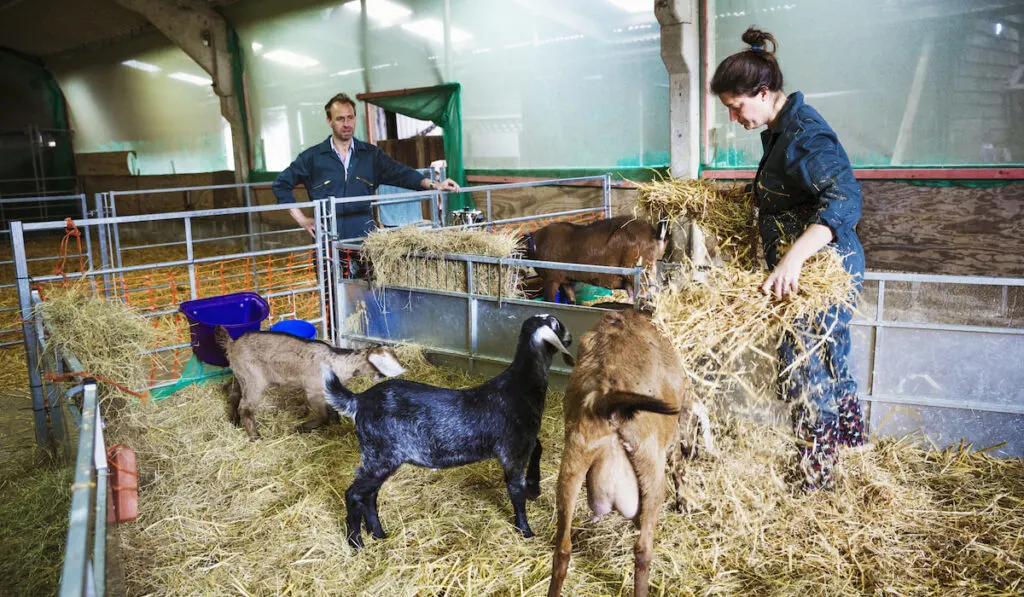
Hay and straw are popular feed sources for goats. Hay is the product of sun-drying grass and other similar plants while straw is the remaining parts of wheat and other similar plants after harvesting their grains.
Hay and straw are always available for goats even in winter. What’s more? Hay and straw are good for bedding (you do not have to worry about goats eating your hay/straw bedding because goats do not like eating food from the ground).
4. Seeds and Grains
Seeds and grains are rich sources of proteins for goats. Examples of seeds that you can give to goats are:
- Watermelon seeds
- Sunflower seeds
- Pumpkin seeds
- Cucumber seeds
- Okra seeds
Examples of grains that you can give to your goats are:
- Wheat
- Barley
- Oats
- Millet
- Rye
What is the difference between seeds and grains? Well, grains and seeds are technically the same, but “seed” is the general term for the product of plants after pollination (usually found in fruits) while grains are the seeds of monocot plants such as wheat and other grasses.
5. Fruits and Vegetables
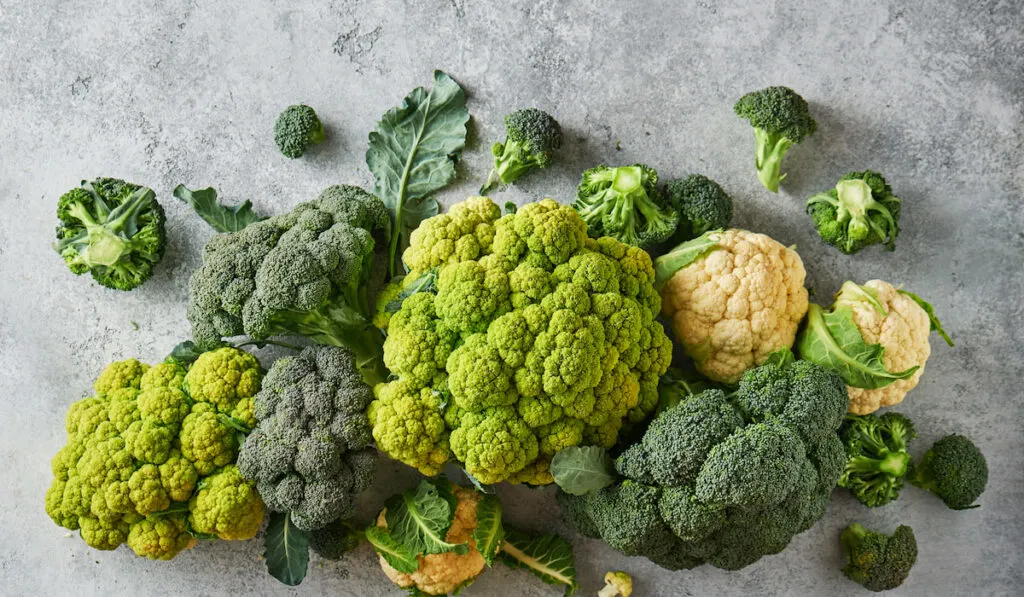
Goats love fruits and vegetables. Just like grass, hay, and pellets, vegetables are an essential part of the goat diet and goats need the nutrients such as vitamins and minerals found in vegetables.
Examples of vegetables that you can feed to your goats are:
- Cabbage
- Kale
- Microgreens
- Cauliflowers
- Broccoli
As for fruits, goats can eat fruits, but not too much of them. Fruits contain a lot of sugars, but not so many proteins. Too many fruits can cause bloating in the stomach of goats.
Examples of fruits that goats can eat are:
- Grapes
- Apples
- Bananas
- Pineapples
- Watermelons
Goats can also eat fruit peels and rinds, so you do not have to throw them away after consumption.
Plants and Other Types of Food That Goats Cannot Eat
Here are some food items (especially plants) that goats should not consume:
1. Nightshade Plants
Nightshade plants are plants in the family Solanaceae. The nightshade family contains a toxin known as solanine. When consumed in high quantity, solanine can be harmful to and even kill goats and other animals.
Examples of plants in the nightshade family are:
- Tomato
- Potato
- Eggplant
- Bell pepper
- Datura
Should goats consume the fruits of nightshade plants? Solanine in nightshades is found in the stem, branches, leaves, and flowers of nightshades, but not in their fruits. Goats and other animals can consume the fruit (or tuber as in the case of potatoes) of nightshades.
2. Elephant Ear Plants
Taros or elephant ear plants have calcium oxalate and also needle-shaped raphides in their leaves. These characteristics of taros can harm goats or even get them injured.
Goats should not eat the leaves of elephant ears.
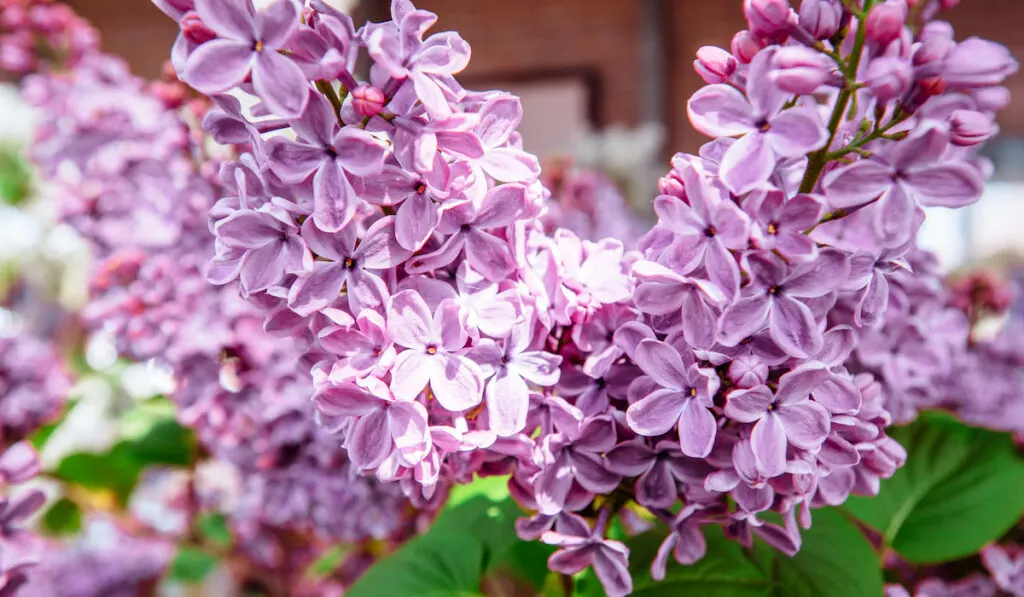
3. Several Ornamental Plants
Ornamental plants can be pretty and make the environment look beautiful, but many species should not go inside the stomach of animals because they might be poisonous.
Examples of ornamental plants that are harmful to goats are:
- Lilacs
- Lily of the Valley
- Mother of Millions
- Mother of Thousands
- Air Plants
- Azaleas
- Oleanders
- Rhododendrons
- Delphinium
Many gardeners do not know the name of their ornamental plants, so it is wise that their goats should avoid every ornamental plant to be safe.
4. Onions and Garlic
Onions, garlic, and other similar bulbs contain a high amount of Sulphur. When eaten in large quantity, onions and garlic can cause bloating of the stomach of goats.
You should remove leftover onions and garlic from your kitchen wastes before giving them to goats. Prevent goats from eating onions and garlic.
5. Foods from Dumpsites
People believe that goats have a strong stomach and can digest anything, so they allow their goats to go to several places to find food.
You should raise goats free-range so that they can explore and find their favorite grasses, but you should not allow them to eat food from dumpsites and other dirty places for fear of contamination.
Related Questions and Answers
1. Why Does Poison Ivy Itch?
The leaves of poison ivy, poison oaks, and a few other poisonous plants have an oil called urushiol. Urushiol can cause rashes and other forms of allergies when our skin comes in contact with it.
2. Is it Normal for Goats to Voluntarily Eat Poisonous Plants?

Goats usually follow their instincts and they do not eat plants that can kill them. If goats are young, starving, or sick, however, they may eat plants that can harm them.
You should consult the vet if you notice your animal eating weird items that can harm them.
3. Why Does Poison Ivy Not Harm Goats?
There is not approved scientific research to explain it, but there are several theories. One theory states that since most goat breeds originate from Africa and other regions with less abundance of food, goats adapted to eating less-favorable foods including a few with toxins. (source)
4. Can You Pet Goats That Ate Poison Ivy?
You should not touch goats that have been exposed to poison ivy because you may develop rashes and bumps. If you can, wash your goats before you have any physical contact with them.
5. Can Goats Eat Paper?
Remember that goats are ruminants. As ruminants, goats can digest a lot of materials that we and other animals cannot digest. An example of materials that goats can digest is cellulose. Cellulose or dietary fiber is the major component of paper.
If the paper is plain white and not covered in any form of ink or chemical, it is safe for goats. Otherwise, please dispose of it properly.
Final Thoughts
Goats can eat poison ivy and a few other seemingly harmful plants. You should, however, be careful when giving such plants to your goats as only a few or no experiments have been conducted to know their effects on the health of goats.
Remember to always provide your goats known safe foods such as grains, hay, grasses, etc.
Resources
- https://smallruminants.ces.ncsu.edu/2016/11/is-it-safe-to-consume-milk-from-dairy-goats-eating-poison-ivy/
- https://goats.extension.org/which-plants-are-poisonous-to-goats/
- https://fiascofarm.com/goats/poisonousplants.htm
- https://www.goatstogo.farm/in-the-news/local-farm-has-goats-to-cure-baaaad-poison-ivy
- https://acaai.org/resources/connect/ask-allergist/can-reaction-poison-ivy-cause-mango-allergy
